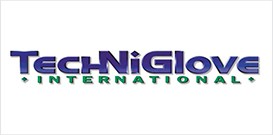Nitrile Allergies? Accelerator-Free Nitrile Can Help
By Fritz Maskrey, Vice President, Business Development, TechNiGlove International
When thinking of allergies in the disposable glove world, natural rubber immediately comes to mind.
A simple solution for this problem was introduced in the 1990s using synthetic polymers. This new material would mimic the properties of natural rubber without the protein allergens that were causing some users to develop allergic reactions. Hence the product we know today as “thin-walled disposable nitrile gloves” was born.
Nitrile Glove Production: Simple but Complicated
To create nitrile products, liquid nitrile is refined and coated onto a ceramic form then cured to create an elastic polymer in the desired shape. The elastic polymer, which has been molded into the shape of varying sizes and lengths of gloves, is then chlorinated inside and out and finished based on the specifications of the intended cleanroom environment or general laboratory use.
Since the inception of nitrile, manufacturers have been competing to create a better and more efficient process for making gloves. The competition has led manufacturers to add certain accelerators intended to decrease the time needed for a glove to cure, reduce the cost of the overall material, give the material a softer feel, and generally provide the customer with an affordable high-performance product.
Certain sulfur-based chemicals have been developed to accomplish these goals. These chemicals have incredibly complicated chemical structures and even more complicated scientific names. While this list of chemicals can have many positive effects, one unfortunate side effect can be an allergic reaction (now known as “nitrile allergies”) similar to that of latex.
Current examples of accelerators used in nitrile glove production include:
- N-cyclohexyl-2-benzothiazole sulfenamide
- 2-Dibenzothiazole disulfide
- Tetramethylthiuram disulfide
- Diphenylguanidine
- 2-Mercaptobenzothiazole
- 3-Methylpiperidine
Does This Mean I’m Allergic to Nitrile Gloves?
Since most of these reactions are not to nitrile itself but to chemicals added during manufacturing, they are considered “Type 4” allergies. Also called cell-mediated or delayed allergies, they occur when T-cells are activated and produce inflammation in the affected area. Type 4 allergies are not antibody related but rather are a type of white blood cell response.
One of the newer technologies used in the production of thin-walled disposable gloves is “accelerator-free” nitrile. Production managers, line engineers, and corporate purchasers should be aware of this option. Choosing gloves made with this material and these methods can drastically reduce reactions for users with Type 4 allergies.
Unlike latex allergies, which can cause more life-threatening allergic reactions, people who react to the accelerators in nitrile gloves usually experience only contact dermatitis (Type 4 Hypersensitivity).
Reactions to nitrile gloves may include hives, blisters, itching, burning, and sensitivity to the sun. These symptoms usually appear one or two days after exposure. Nitrile glove wearers can also experience non-allergic irritant contact dermatitis, the symptoms of which include blisters, lesions, ulcers, and dry skin.
Techniglove’s Nitrile and Accelerator-Free Nitrile Gloves
Key attributes of our accelerator-free products include:
- Elongation and tensile strength over 300% stronger than traditional nitrile formulations
- Fit, feel, and function almost identical to latex gloves
- Less material with superior strength
Contact your Fisher Scientific sales representative for information about a wide selection of nitrile gloves including Rival (RV400 Series) accelerator-free, low extractable, powder-free nitrile examination gloves.
TechNiGlove International is a leading manufacturer of disposable gloves for contamination-controlled environments. TechNiGlove’s nitrile, sterile nitrile, and latex gloves offer consistent quality for use in cleanrooms, sterile non-medical environments, pharmaceutical environments, and industrial settings.






